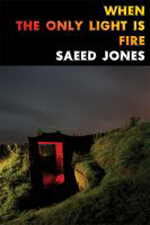Review | When the Only Light Is Fire, by Saeed Jones
Sibling Rivalry Press, 2011
 |
“I speak / in the language of sharp turns,” Jones ends “Jasper, 1998: I,” and though he identifies the voice here as James Byrd, Jr., who was dragged behind a pickup until dead by three white men, the signal bleeds into two channels at once: social or interpersonal consciousness and, to a lesser degree, ars poetica. Much of When the Only Light Is Fire swerves between tender lyric and violent narrative, often within the same poem: “You answer his fist . . . the blow / shatters you to sparks,” “he drinks / to keep loving you.”
The tension between these two directions—or, perhaps, the magnetism—comes from the poems’ grounding in their speakers: the reader rarely hears voiceover exposition but rather, intensive testimony. The testimony acts not merely to deliver the incident but to extend it, as if the experience, to achieve closure, demands its own telling. In this way, speech itself becomes an integral element of the poems—“Listen to my darkness, / my half-eclipsed notes”—with recurrent gestures of the mouth, the teeth, and the tongue, the latter of which, in Jones’s chapbook, represents both a speaking muscle and a sexual muscle, a body part as much as incorporeal speech.
The narrator, waiting in “Room 31,” says:
I’ve left
the door ajar, enough
for night to push
its tongue into the room
Here, just as the tongue enters, Jones swerves against the narrative momentum to reveal the dramatic situation and, therefore, the stakes of the poem, a disclosure through question:
(Are you on your way?
Where did you tell your wife
you were going?)
The “you” in this poem, however, never arrives, but elsewhere when the speaker and his lover do meet, it is not without injury, emotional or physical. “[T]he hurt was exquisite” says the speaker of “Blue Prelude,” and later, the “burly man” of “Prelude to a Bruise”:
Your back, blue-black.
Your body, burning.
I like my black boys broke, or broken.
I like to break my black boys in.
Perhaps, then, in When the Only Light Is Fire, one cannot feel tenderness without a wound. Even in “Boy In Stolen Evening Gown,” the chapbook’s most revelatory poem, the speaker’s metamorphosis—not from a boy to a woman, but rather a boy removed from the cocoon of the gown—is heavy with the macabre:
In this field of thistle, I am the improbable
lady. How I wear the word: sequined weight snagging
my saunter into overgrown grass, blonde
split-end blades. I waltz in an acre of bad wigs.
Sir who is no one, sir who is yet to come, I need you
to undo this zipped back, trace the chiffon
body I’ve borrowed.
And later:
Ask me
and I’ll slip out of this softness, the dress
a black cloud at my feet.
I could be the boy wearing nothing,
a negligee of gnats.
The poem itself acts as a divestment, a kind of disclosure between the speaker and the “you.” And what’s left?—nothing, a negligee of gnats.
Though the chapbook has a simple design—a black background, a photograph of some kind of illuminated shed, titled with a fire-suggestive font color—the forty-plus-page selection means to feel like a full-length collection, as it should, for these poems have enough fuel to burn through a whole book, its flame whipping wildly, dangerously close to flammable material. ![]()
Saeed Jones is the author of one chapbook, When the Only Light is Fire (Sibling Rivalry Press, 2011). He received his MFA in creative writing at Rutgers University–Newark.